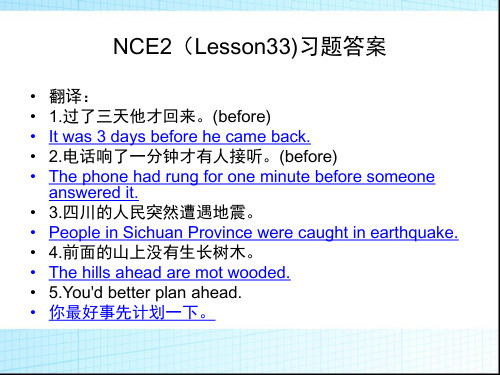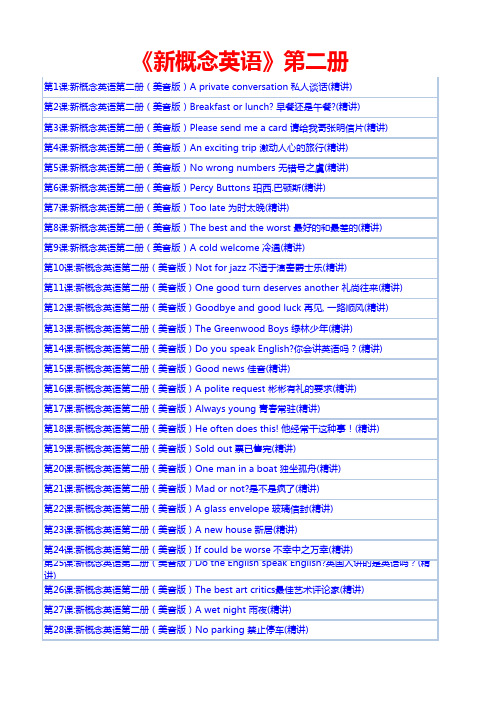(完整word版)裕兴新概念英语第二册笔记第三十四课课文讲解
新概念英语第二册第34课课文

新概念英语第二册第34课课文摘要:1.新概念英语第二册第34 课课文概述2.文章的主要内容和结构3.文章中的重点词汇和短语4.文章的语法知识和应用5.文章的学习建议和心得体会正文:新概念英语第二册第34 课课文是一篇关于如何学习英语的文章,主要讲述了学习英语的重要性以及如何有效地学习英语。
文章首先介绍了学习英语的必要性,接着阐述了学习英语的方法和技巧,最后给出了一些建议和心得体会。
文章的主要内容和结构如下:第一部分,学习英语的重要性。
文章通过举例说明了英语在国际交流、商务、科技等领域的重要性,强调了学习英语的必要性。
第二部分,学习英语的方法和技巧。
文章列举了一些实用的学习英语的方法和技巧,如坚持每天学习、多听多说多读多写、积累词汇和短语等。
第三部分,学习英语的建议和心得体会。
文章给出了一些建议,如选择适合自己水平的教材、找到适合自己的学习方法等。
同时,文章还分享了一些学习英语的心得体会,如保持积极的学习态度、不怕犯错等。
文章中的重点词汇和短语有:1.English is the most widely spoken language in the world.(英语是世界上使用最广泛的语言。
)2.In order to improve your English, you should read and write more.(为了提高你的英语水平,你应该多读多写。
)3.It"s important to practice your spoken English.(练习口语很重要。
)文章的语法知识和应用主要包括:1.一般现在时:表示经常或习惯性的动作或状态。
如:I study English every day.(我每天学习英语。
)2.一般将来时:表示将来要发生的动作或状态。
如:I will study English next year.(我明年要学习英语。
)通过学习这篇文章,我们可以了解到学习英语的重要性和方法,从而更好地提高自己的英语水平。
裕兴新概念英语第二册笔记完美打印版.doc

裕兴新概念英语第二册笔记完美打印版.docLesson 1 A private conversation【New words and expressions】★private① adj. 私人的private life 私生活private school 私立学校② adj. 普通的private citizen 普通公民I’m a private citizen. (citizen n. 公民)private soldier 大兵《Private Ryan》《拯救大兵瑞恩》) public adj. 公众的,公开的(private的反义词)public school 公立学校public letter 公开信public place 公共场所privacy n.隐私It’s privacy. 这是我的隐私!(不愿让别人知道的)★conversation n.谈话have a + talk/chat/dialogue/conversation/gossip 名词变动词conversation 一般用于正式文体中, 内容上往往不正式subject of conversation 话题They are having a conversation.talk 内容可正式可不正式, 也可以私人Let’s have a talk.dialogue 对话, 可以指正式国家与国家会谈China and Korea are having a dialogue.chat 闲聊,就是北京人说的“侃”,无关紧要的事。
gossip 嚼舌头, 说长道短★theatre n.剧场, 戏剧cinema n.电影院★seat n.座位have a good seat/place,这里的seat指place(指地点),而不是chair.take a seat/take your seat 坐下来, 就坐Is the seat taken? 这个位置有人吗?请坐的3种说法:Sit down, please. (命令性)Take your seat, please.Be seated, please. (更礼貌)作为动词的seat与sit的区别sit(sat,)vi. 就座He is sitting there.他坐在那儿。
裕兴版新概念英语第二册笔记L1-L15

Original works by Gerry Ye (QQ:75244818 WEIBO: 那夜de风情)New Concept English Season 1Lesson 1Get down to business 言归正传Private affairs 私事That is for your private ear 只说给你听conversation/talk/chat/discuss/say/gossip(v/n)/speak/make a speechGo to the film/cinema 去看电影Theatre=theater(U.S)=play house 戏院Have/take a seat n./// seatbelt=safety beltin the driver's seat=in the leader's seat(place)Back-seat drive 爱指手画脚的人Seat sb vt./seat yourself/be seat, please./would you have a seat.Soap play 肥皂剧 / TV play 电视剧/there is no play 没戏了/play/drama/Beijing operaThink aloud 自言自语Pay (some/more/close密切/great/enough/little) attention to sthTurn a blind eye to 视而不见/turn a deaf ear to 充耳不闻/draw (attract) one’s attention 吸引...注意力May i get your attention please/that's all thank you for your attention/timeHe’s really a bear 粗鲁的人/a bear market/ a bull market/a bear hug 熊抱i can't bear the rude fellow/i can't bear to bear/bearable 可忍受的/unbearable难以忍受的Bear/stand/put up with sb 忍受某人Business hours 营业时间/how is your business? half and half/not bad 还行/couldn't be better Business/thing/foreign、public affair外交 (公共) 事务/Personal effects 私人物品matter/do good business 生意做的很好/it's none of your business(事情同affair/matter)Mind your own business管好你自己的事Rude/rudely/rudeness/politeEnjoy equal rights/enjoy oneself=have a good time/ I really enjoyed staying with you 和你在一起很开心/enjoy talking to youI couldn't fall asleep; I just turned over and overWhoever slaps you on your right cheek, turn the other to him also- from "bible" 宽容和原谅别人in the end/at last/as a result/eventually/finallyHave a word with sb 和某人说话/have words with sb和某人吵架He was very cross 生气的Bear’s service 好心帮倒忙I can't hear actors=I can't hear actors's words 用具体代替抽象,借喻,我听不见演员说的话了Lesson 2 breakfast or lunchUntil 延续性动词,not until 非延续性动词i will wait for you until you come back/i won't leave until you come backoutside help 外部帮助/it's outside my businessdiamond ring/dark rings around her eyes 黑眼圈Ring finger无名指the third finger/thumb拇指/the first finger 食指pointerThe door bell ring/i rang the bell 按门铃/ring sb =call sb= give sb a phone call/ring off=hang off挂电话a country(国家/乡下)cousin 乡巴佬 nephew/niece/cousinam i repeating myself?我以前说过这件事吗?learn by repetition 通过反复学习第三人称单数,y 变i +es , o/s/x/ch/sh/+esThis picture is of great value, 这幅画有极大的价值The sun rises in the east and sets in the westdo you ever read in bed 时间副词,助动词之后,实义动词之前i sometimes stay in bed until lunchtimeGo/come/leave/arrive/land/meet/die/start/return/join 这些词用进行时表示即将开始的动作Always/forever/continually/constantly 在进行时中表示感谢色彩,如赞赏,厌恶Believe/doubt/see/hear/know/understand/belongto/thing/consider/feel/look/seem/show/mind/have/sound/taste/require/possess/care/like/hate /love/detest/ 不用现在进行时。
新概念英语第二册第34课原创课件剖析

• •
•
பைடு நூலகம்
Her parents worries about her weight. Her weight worries her parents.
6-10 ACBAC
11-14 BCBC
• 选择正确答案并填入空格 内
• • • • • •
1. past 2. passed 3. other;next 4. beach 5. found 6. arrested
• 完形填空 • 1-5 BACDB • 6-10 CDABC • 阅读理解 • 1-3 DCB
• • • • • • • • • • • • • •
6. Two people were ahead of us, and travelling fast. 有两个人在我们前面,走得很快。 7. The match lights easily. 这火柴容易划着。 8. I enjoy light wine. 我喜欢清淡的酒。 9. He is a light sleeper. 他睡觉易醒。(睡得浅) 10. She is light of foot. 她步伐轻快。 11. Let's see a light film for a change. 让我们看一场轻松的电影调节一下。 12. 这位老人一直在与病魔斗争。 The old man has been struggling with illness.
3. In the letter he was asked to call at the station.
裕兴新概念英语第二册笔记打印版本教学教材

裕兴新概念英语第二册笔记打印版本Lesson 1 A private conversation【New words and expressions】★private① adj. 私人的private life 私生活 private school 私立学校② adj. 普通的 private citizen 普通公民I’m a private citizen. (citizen n. 公民)private soldier 大兵《Private Ryan》《拯救大兵瑞恩》)public adj. 公众的,公开的(private的反义词)public school 公立学校 public letter 公开信public place 公共场所 privacy n.隐私It’s privacy. 这是我的隐私!(不愿让别人知道的)★conversation n.谈话have a + talk/chat/dialogue/conversation/gossip 名词变动词conversation 一般用于正式文体中, 内容上往往不正式subject of conversation 话题They are having a conversation.talk 内容可正式可不正式, 也可以私人Let’s have a talk.dialogue 对话, 可以指正式国家与国家会谈China and Korea are having a dialogue.chat 闲聊,就是北京人说的“侃”,无关紧要的事。
gossip 嚼舌头, 说长道短★theatre n.剧场, 戏剧cinema n.电影院★seat n.座位have a good seat/place,这里的seat指place(指地点),而不是chair.take a seat/take your seat 坐下来, 就坐Is the seat taken? 这个位置有人吗?请坐的3种说法 :Sit down, please. (命令性)Take your seat, please.Be seated, please. (更礼貌)作为动词的seat与sit的区别sit(sat,)vi. 就座He is sitting there.他坐在那儿。
《新概念英语》第二册 电子版

《新概念英语》第二册第1课:新概念英语第二册(美音版)A private conversation 私人谈话(精讲)第2课:新概念英语第二册(美音版)Breakfast or lunch? 早餐还是午餐?(精讲)第3课:新概念英语第二册(美音版)Please send me a card 请给我寄张明信片(精讲)第4课:新概念英语第二册(美音版)An exciting trip 激动人心的旅行(精讲)第5课:新概念英语第二册(美音版)No wrong numbers 无错号之虞(精讲)第6课:新概念英语第二册(美音版)Percy Buttons 珀西.巴顿斯(精讲)第7课:新概念英语第二册(美音版)Too late 为时太晚(精讲)第8课:新概念英语第二册(美音版)The best and the worst 最好的和最差的(精讲)第9课:新概念英语第二册(美音版)A cold welcome 冷遇(精讲)第10课:新概念英语第二册(美音版)Not for jazz 不适于演奏爵士乐(精讲)第11课:新概念英语第二册(美音版)One good turn deserves another 礼尚往来(精讲)第12课:新概念英语第二册(美音版)Goodbye and good luck 再见, 一路顺风(精讲)第13课:新概念英语第二册(美音版)The Greenwood Boys 绿林少年(精讲)第14课:新概念英语第二册(美音版)Do you speak English?你会讲英语吗?(精讲)第15课:新概念英语第二册(美音版)Good news 佳音(精讲)第16课:新概念英语第二册(美音版)A polite request 彬彬有礼的要求(精讲)第17课:新概念英语第二册(美音版)Always young 青春常驻(精讲)第18课:新概念英语第二册(美音版)He often does this! 他经常干这种事!(精讲)第19课:新概念英语第二册(美音版)Sold out 票已售完(精讲)第20课:新概念英语第二册(美音版)One man in a boat 独坐孤舟(精讲)第21课:新概念英语第二册(美音版)Mad or not?是不是疯了(精讲)第22课:新概念英语第二册(美音版)A glass envelope 玻璃信封(精讲)第23课:新概念英语第二册(美音版)A new house 新居(精讲)第24课:新概念英语第二册(美音版)If could be worse 不幸中之万幸(精讲)第25课:新概念英语第二册(美音版)Do the English speak English?英国人讲的是英语吗?(精讲)第26课:新概念英语第二册(美音版)The best art critics最佳艺术评论家(精讲)第27课:新概念英语第二册(美音版)A wet night 雨夜(精讲)第28课:新概念英语第二册(美音版)No parking 禁止停车(精讲)第29课:新概念英语第二册(美音版)Taxi! 出租汽车(精讲)第30课:新概念英语第二册(美音版)Football or polo? 足球还是水球?(精讲)第31课:新概念英语第二册(美音版)Success story 成功者的故事(精讲)第32课:新概念英语第二册(美音版)Shopping made easy 购物变得很方便(精讲)第33课:新概念英语第二册(美音版)Out of the darkness 冲出黑暗(精讲)第34课:新概念英语第二册(美音版)Quick work 破案 “神速”(精讲)第35课:新概念英语第二册(美音版)Stop thief!捉贼!(精讲)第36课:新概念英语第二册(美音版)Across the Channel 横渡海峡(精讲)第37课:新概念英语第二册(美音版)The Olympic Games 奥林匹克运动会(精讲)第38课:新概念英语第二册(美音版)Everything except the weather 唯独没有考虑到天气(精讲第39课:新概念英语第二册(美音版)Am I all right? 我是否痊愈?(精讲)第40课:新概念英语第二册(美音版)Food and talk 进餐与交谈(精讲)第41课:新概念英语第二册(美音版)Do you call that a hat? 你把那个叫帽子吗?(精讲)第42课:新概念英语第二册(美音版)Not very musical 并非很懂音乐(精讲)第43课:新概念英语第二册(美音版)Over the South Pole 飞越南极(精讲)第44课:新概念英语第二册(美音版)Through the forest 穿过森林(精讲)第45课:新概念英语第二册(美音版)A clear conscience 问心无愧(精讲)第46课:新概念英语第二册(美音版)Expensive and uncomfortable 既昂贵又受罪(精讲)第47课:新概念英语第二册(美音版)A thirsty ghost 嗜酒的鬼魂(精讲)第48课:新概念英语第二册(美音版)Did you want to tell me something? 你想对我说什么吗?第49课:新概念英语第二册(美音版)The end of a dream 美梦告终(精讲)第50课:新概念英语第二册(美音版)Taken for a ride 乘车兜风(精讲)第51课:新概念英语第二册(美音版)Reward for virtue 对美德的奖赏(精讲)第52课:新概念英语第二册(美音版)A pretty carpet 漂亮的地毯(精讲)第53课:新概念英语第二册(美音版)Hot snake 触电的蛇(精讲)第54课:新概念英语第二册(美音版)Sticky fingers 粘糊的手指(精讲)第55课:新概念英语第二册(美音版)Not a gold mine 并非金矿(精讲)第56课:新概念英语第二册(美音版)Faster than sound! 比声音还快!(讲解)第57课:新概念英语第二册(美音版)Can I help you, madam? 您要买什么,夫人?(精讲)第58课:新概念英语第二册(美音版)A blessing in disguise? 是因祸得福吗?(精讲)第59课:新概念英语第二册(美音版)In or out? 进来还是出去?(精讲)第60课:新概念英语第二册(美音版)The future 卜算未来(精讲)第61课:新概念英语第二册(美音版)Trouble with the Hubble 哈勃望远镜的困境(讲解)第62课:新概念英语第二册(美音版)After the fire 大火之后(精讲)第63课:新概念英语第二册(美音版)She was not amused 她并不觉得好笑(精讲)第64课:新概念英语第二册(美音版)The Channel Tunnel 海峡隧道(精讲)第65课:新概念英语第二册(美音版)Jumbo versus the police 小象对警察(精讲)第66课:新概念英语第二册(美音版)Sweet as honey! 像蜜一样甜!(精讲)第67课:新概念英语第二册(美音版)Volcanoes 火山(精讲)第68课:新概念英语第二册(美音版)Persistent 纠缠不休(精讲)第69课:新概念英语第二册(美音版)But not murder!并非谋杀!(精讲)第70课:新概念英语第二册(美音版)Red for danger 危险的红色(精讲)第71课:新概念英语第二册(美音版)A famous clock第72课:新概念英语第二册(美音版)A car called bluebird第73课:新概念英语第二册(美音版)The record-holder第74课:新概念英语第二册(美音版)Out of the limelight第75课:新概念英语第二册(美音版)SOS第76课:新概念英语第二册(美音版)April Fools Day第77课:新概念英语第二册(美音版)A successful operation第78课:新概念英语第二册(美音版)The last one?第79课:新概念英语第二册(美音版)By air第80课:新概念英语第二册(美音版)The Crystal Palace第81课:新概念英语第二册(美音版)Escape第82课:新概念英语第二册(美音版)Monster or fish?第83课:新概念英语第二册(美音版)After the elections第84课:新概念英语第二册(美音版)On strike第85课:新概念英语第二册(美音版)Never too old to learn第86课:新概念英语第二册(美音版)Out of control第87课:新概念英语第二册(美音版)A perfect alibi第88课:新概念英语第二册(美音版)Trapped in a mine第89课:新概念英语第二册(美音版)A slip of the tongue 第90课:新概念英语第二册(美音版)What第91课:新概念英语第二册(美音版)Three men in a basket 第92课:新概念英语第二册(美音版)Asking for trouble第93课:新概念英语第二册(美音版)A noble gift第94课:新概念英语第二册(美音版)Future champions第95课:新概念英语第二册(美音版)A fantasy第96课:新概念英语第二册(美音版)The dead return。
裕兴新概念英语第二册笔记 第三十三课 课文讲解.
裕兴新概念英语第二册笔记第三十三课课文讲解老猴子咬菜根学习交流Lesson 33 Out of the darknessNearly a week passed before the girl was able to explain what had happened to her. One afternoon she set out from the coast in a small boat and was caught in a storm. Towards evening, the boat struck a rock and the girl jumped into the sea. Then she swam to the shore after spending the whole night in the water. During that time she covered a distance of eight miles. Early next morning, she saw a light ahead. She knew she was near the shore because the light was high up on the cliffs. On arriving at the shore, the girl struggled up the cliff towards the light she had seen. That was all she remembered. When she woke up a day later, she found herself in hospital. 参考翻译:几乎过了一个星期,那姑娘才能讲述自己的遭遇。
一天下午,她乘小船从海岸出发,遇上了风暴。
天将黑时,小船撞在了一块礁石上,姑娘跳进了海里。
她在海里游了整整一夜才游到岸边。
裕兴新概念英语第二册笔记 课文讲解
TextI love travelling in the country, but I don't like losing my way.I went on an excursion recently, but my trip took melonger than I expected.'I'm going to Woodford Green,' I said to the conductor as I got on the bus, 'but I don't know where it is.''I'll tell you where to get off.' answered the conductor.I sat in the front of the bus to get a good view of the countryside. After some time, the bus stopped. Looking round, I realized with a shock that I was the only passenger left on the bus.'You'll have to get off here,' the conductor said. 'This is as far as we go.''Is this Woodford Green?' I asked.'Oh dear,' said the conductor suddenly. 'I forgot to put you off.''It doesn't matter,' I said. 'I'll get off here.''We're going back now,' said the conductor.Taken for a ride 被当作是乘车兜风take for 把…认为是,把…看成为;take sb for a ride 欺骗某人, 诈骗某人标题相关 1乘车兜风2我被骗了I love travelling in the country, but I don't like losing my way.我喜欢在乡间旅行, 但却不愿意迷路.love to do一次性喜欢like to do一次性喜欢prefer to do一次性喜欢love doing长期性喜欢like doing长期性喜欢prefer doing长期性喜欢love to do 想要做某事love doing 喜欢做enjoy doing 喜欢做eg Love me , love my dog. 爱屋及乌lose one’s way 迷路;lose one’s job 失业lose one’s face 丢脸lose one’s temper 失去控制,发脾气lose weight减肥put on weight 增加体重、加胖lose one’s cool 沉不住气、失控发火keep one’s cool保持镇定lose one’s head 昏了头,冲动keep one’s shirt on 保持冷静;lose one’s life丧命lose one’s breath 喘不过气来,呼吸困难、喘息,上气不接下气lose oneself 沉迷于eg He lost himself in reading . 他沉迷于读书.区别 lose , loose , misslose [lu:z] v丢失;迷失(lost - lost)eg I don’t like losing my way.我不喜欢迷路。
(完整word版)裕兴新概念英语第二册笔记第36课
Lesson 36 Across the channel横渡海峡What is Debbie going to try to do?Debbie Hart is going to swim across the English Channel tomorrow. She is going to set out from the French coast at five o'clock in the morning. Debbie is only eleven years old and she hopes to set up a new world record. She is a strong swimmer and many people feel that she is sure to succeed. Debbie's father will set out with her in a small boat. Mr. Hart has trained his daughter for years. Tomorrow he will be watching her anxiously as she swims the long distance to England. Debbie intends to take short rests every two hours. She will have something to drink but she will not eat any solid food. Most of Debbie's school friends will be waiting for her on the English coast. Among them will be Debbie's mother, who swam the Channel herself when she was a girl.参考译文黛比.哈特准备明天横渡英吉利海峡。
新概念英语第二册笔记(全部96课全)
语英师老李语英师老李语英师老李语英师老李语英师老李语英师老李语英师老李语英师老李语英师老李语英师老李语英师老李语英师老李语英师老李语英师老李语英师老李语英师老李语英师老李语英师老李语英师老李语英师老李语英师老李语英师老李语英师老李语英师老李语英师老李语英师老李语英师老李语英师老李语英师老李语英师老李语英师老李语英师老李语英师老李语英师老李语英师老李语英师老李语英师老李语英师老李语英师老李语英师老李语英师老李语英师老李语英师老李语英师老李语英师老李语英师老李语英师老李语英师老李语英师老李语英师老李。
- 1、下载文档前请自行甄别文档内容的完整性,平台不提供额外的编辑、内容补充、找答案等附加服务。
- 2、"仅部分预览"的文档,不可在线预览部分如存在完整性等问题,可反馈申请退款(可完整预览的文档不适用该条件!)。
- 3、如文档侵犯您的权益,请联系客服反馈,我们会尽快为您处理(人工客服工作时间:9:00-18:30)。
裕兴新概念英语第二册笔记 第三十四课 课文讲解 老猴子咬菜根学习交流 从课文找出所有的被动句,并将其还原为主动语态: 1. In the letter he was asked to call at the station. → In the letter the police asked him to call at the station. 2. Dan wondered why he was wanted by the police. → Dan wondered why the police wanted him. 3. At the station, he was told by a smiling policeman that his bicycle had been found. → At the station, a smiling policeman told him that they had found his bicycle. 4. …the bicycle was picked up in a small village… → The police picked up the bicycle in a small village. 5. It is now being sent to his home by train. → They are now sending it to his home by train. 6. It was stolen twenty years ago… → Someone stole it twenty years ago. Dan Robinson has been worried all week. has been worried 现在完成时表示从过去一直延续到现在现在,并且可能继续下去的动作。 be worried about sth 对…感到担心 be anxious about sth 对…感到焦虑 all week 整整一星期 all day long 整整一天 all year round 整年 all day and all night 整日整夜 Last Tuesday he received a letter from the local police. receive a letter from/hear from sb 收到…的来信 local adj. 1) 地方的,本地的,地区的(尤作宾语)belong to a particular place or district local news 当地新闻 a local station 地方的一个车站 local farmers 当地的农民 local government 地方政府 local time 当地时间 local color 地方特色 2) (身体上)局部性的 a local pain 局部疼痛 3) a local line 支线(美) a local train (火车的)普通列车 In the letter he was asked to call at the station. in the letter 在信里面 in the newspaper 在报纸上 call at 拜访 call on sb 拜访某人:pay sb a short visit call at some place 去某地,参观某地,光顾某地 eg. I called on George yesterday. 昨天我拜访乔治了。 eg. He calls at every house in the street once a month. 他每月光顾一次这条街上的每一家。 call out to sb 对…大喊大叫 eg. He called out to me but I didn’t hear him. 他对我大声喊,但我没听见。 call sb up: call sb 给…打电话 eg. She’ll call you up tomorrow. 她明天会给你打电话。 call off: cancel 取消 eg. It began to rain so we called off the match. 天下雨,所以我们取消了比赛。 Dan wondered why he was wanted by the police but he went to the station yesterday and now he is not worried anymore. wonder v. 疑惑,想知道 why引导宾语从句,采用正常陈述语序 want 1) vt. 需要某人(在场) eg. You are wanted on the phone. 有人打电话找你。 /Someone is calling you. eg. He was wanted by the police. 警察找他。 2) 想要,希望 want to do sth eg. I want to go to Europe. want sb to do sth eg. She wanted him to repair their grandson’s bicycle. want sb doing sth 需要某人做某事 eg. I don’t want you meddling in my private affairs. 我不需要你干扰我的私事。 meddle ['medl] vi.干涉, 干预(他人事务) want sth to be done police 集合名词(谓语动词为复数) a policeman 一名警察 a policewoman 一名女警察 not anymore 不再 /no more not any longer/no longer (时间上的)不再 eg. I won’t see you any more. 我不会再见你了。 /I will see you no more. eg. He is not handsome any more. 他不再英俊潇洒。 eg. He is not wealthy any more. 他不再富有。 eg. I won’t torture you any more. 我不会在折磨你了。 torture ['tɔ:tʃə] n.拷问, 刑讯;折磨; 痛苦 vt.拷问, 折磨 At the station he was told by a smiling policeman that his bicycle had been found. smiling smile v./n. 微笑 smiling adj. 微笑的,笑容可拘的 unsmiling adj. 不苟言笑的 a large unsmiling lady 身材高大不苟言笑的女士 Five days ago the policeman told him the bicycle was picked up in a small village four hundred miles away. pick up 1) 拾起,捡起 eg. He picked up the wallet and put it into his own pocket. 他捡起钱包放进自己的口袋里。 2) 接受(信号,节目) pick up radio programmes 收听广播节目 3) 通过实践学会 (专门学习:study/learn) eg. My neighbor is an American. We get along well. So I pick up English easily. 我的邻居是美国人。我们相处融洽,所以我很容易地学会英语。 4) 接…,让…上车 eg. I’ll pick you up at the corner of the street. 我到街上的拐角去接你。 It is now being sent to his home by train. by train 用火车 by bus 乘公交车 by road 通过陆路 by sea 通过水路 by air 通过空中,乘飞机 He was amused too because he never expected the bicycle to be found. amused amuse v. 逗乐,使…快乐 amuse oneself 自娱自乐 eg. Her story amused the children greratly. 她的故事逗得孩子们很开心。 amused adj. 愉快的,开心的,好玩的 eg. He had an amused look on his face. 他脸上有着愉快的表情。 amusing adj. 令人好笑的 an amusing story 令人好笑的故事 interesting---interested surprising---surprised exciting---excited expect v. 预料,预计,期待,盼望 expect sth to be done 期待某事被做 expect to do sth 期待做某事 expect sb to do sth 期待/预料某人做某事 eg. We expected him to arrive yesterday. 我们原以为他昨天能到。 It was stolen twenty years ago when Dan was a boy of fifteen! eg. This time, she will be a girl of seventeen. 这次,她将扮演一个十七岁的少女。 Special Difficulties 关于call的练习,用恰当的词填空: 1. I called on you five times yesterday. Were you out? 2. It’s too late to go to the pictures. Why don’t we call the whole thing off?
